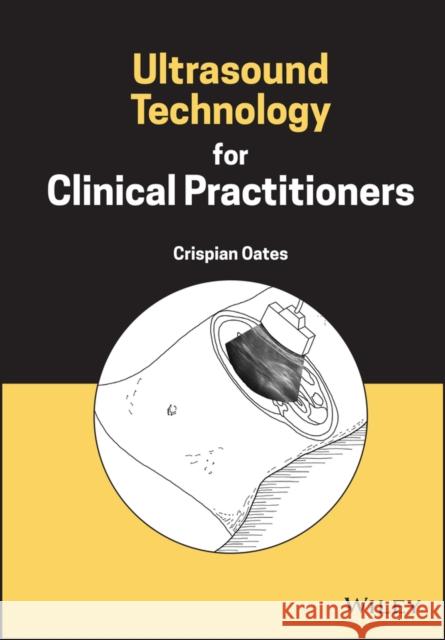Ultrasound Technology for Clinical Practitioners » książka



Ultrasound Technology for Clinical Practitioners
ISBN-13: 9781119891550 / Angielski / Twarda / 2023 / 320 str.
Ultrasound Technology for Clinical Practitioners
ISBN-13: 9781119891550 / Angielski / Twarda / 2023 / 320 str.
(netto: 441,90 VAT: 5%)
Najniższa cena z 30 dni: 458,33
ok. 30 dni roboczych.
Darmowa dostawa!
Wydanie ilustrowane
Acknowledgments xviiList of Abbreviations xixIntroduction 1Chapter 1 The Basic Physics of Ultrasound 5Sound Waves 5Describing Waves 9Energy in a Sound Wave 11Ultrasound Pulses 12Energy Spectrum of a Pulse 13Bandwidth 14Speed of Sound (C) 16Characteristic Acoustic Impedance, Z0 20Energy in a Sound Wave 22Decibels 23Chapter 2 The Interaction of Ultrasound with Tissue 25Reflection and Transmission at a Plane Interface 25Poor Visualisation 29Scattering 30Attenuation 34The Journey of the Ultrasound Pulse 37User Control 37References 38Chapter 3 Beam Shapes 39Simple Beam Shape Model 40Huygen's Wavelet Model and Diffraction 43Focusing 44Beam Forming with Transducer Arrays 47Beam Steering 50Electronic Focusing 52Resolution 54Clutter 58Reference 58Chapter 4 The Ultrasound Probe 59The Transducer 59Backing Layer 62Matching Layer 63Front Face Lens 65Wide Band Transducers 65Construction of an Array 66CMUT Technology 661-D, 1.5-D, and 2-D Arrays 68References 72Chapter 5 Image Formation 73Image Modes 74Linear Image Formation 763D Imaging 80Cine Loop 82Endoprobes 82Choosing A Probe 84Focusing 84Increasing Frame Rate 86User Control 86Ultrasound Harmonics 89Coded Excitation 92References 94Chapter 6 The B-Mode Scanner 95Transmission Side of a Scanner 95User Controls 96Receive Side of a Scanner (Rx) 97Advantages of Digitising 101Dynamic Range and Transfer Function (Greyscale Mapping) 102Contrast Resolution 106User Controls 106Image Memory 106Frame Freeze 106Read and Write Zoom 107Image Processing 108User Control 108Chapter 7 Image Quality and Artefacts 111Acoustic Window 111Frame Rate: Frames Per Second (fps) 112Interlacing Scan Lines 113Interpolation - Writing in 'Extra Lines' 114Speckle 115Frame Averaging or Persistence 116User Control 117Spatial Compound Imaging 117Adaptive Filtering 118Artefacts 122Speed of Sound Artefacts 122Attenuation Artefacts 127Reflection Artefacts 130Anisotropy 134Beam Shape Artefacts 135Temporal Artefacts 137Final Example 139References 140Chapter 8 Principles of Doppler Ultrasound 141The Doppler Effect 141The Doppler Equation 143Duplex Ultrasound 144CW Doppler 145CW Doppler Summary 152Pulsed Wave Doppler (PW Doppler) and Range Gating 152Intrinsic Spectral Broadening (ISB) 160Question: What Doppler Angle Should We Use? 162User Controls 163Peak Velocity Envelope 165Average Velocity 167Doppler Artefacts 170References 173Chapter 9 Principles of Colour Doppler Ultrasound 175Autocorrelation 177Colour Scale 180Frame Rate 181User Controls 181CDU and the Doppler Angle 183Colour Aliasing 183User Controls 185Discrimination of Stationary Targets 187User Controls 188Power Doppler (PD) 188CDU Artefacts 190Colour Sensitivity 192Presets 194Colour M-Mode 194Tissue Doppler Imaging (TDI) 194Myocardial Strain Imaging 197Speckle Tracking Echocardiography STE 199References 202Chapter 10 Making Measurements 203Accuracy 204Precision 204How Accurate or Precise Do We Need To Be? 205Reproducibility 205Systematic and Random Errors 206Ultrasound Measurements in Practice 206Physical Constraints 207Sonographer-Based Constraints 209Principles for Making Reliable Measurements 209Measurement of Circumference, Area, and Volume 213Doppler Waveform Measurements 216Waveform Indices 219Colour Doppler Ultrasound 221Measurement of Volume Flow Q 221References 224Chapter 11 Safety and Quality Assurance 225Energy, Power, and Intensity 226Measuring Intensity 227Intensity 227Factors Affecting Damage Potential 230Thermal Effects 231Thermal Index (TI) 232Transducer Self-Heating 234Nonthermal Effects 235Radiation Force 235Streaming 235Cavitation 236Mechanical Index (MI) 239Alara 239Contrast Agents 240Quality Assurance and Routine Checks 241Suggested Routine User Checks 241The Use of Test Objects 244Personal Risk Management 245New Techniques in Ultrasound 246References 247Chapter 12 Advanced Topics 249Contrast Agents (CA) 249Behaviour of Bubbles in the Ultrasound Field 251Contrast Agent Harmonics 252Flashing 254Advanced Micro-Bubble Techniques 255B-Flow Blood Vessel Imaging 256Doppler Measurement of Pressure Gradients 260Advanced Image Processing 261Artificial Intelligence 261Segmentation 262Examples (1-3) 262Computer-Aided Diagnosis (CAD) 263Diagnosis with Cad 268Fusion Imaging 269Needle Visualisation and Guidance 271References 274Chapter 13 Ultrafast Ultrasound 277Synthetic Aperture Imaging (SA) 278Plane-Wave Beamforming 279Summary 283Speed of Sound Correction 283Ultrafast Doppler 286Vector Flow Imaging (VFI) 291References 298Chapter 14 Elastography 301Background Theory 302Elastography 303Methods of Applying The Distorting Force 303Strain Elastography (SE) 303User Controls 307SE Artefacts 310Acoustic Radiation Force Impulse Imaging (ARFI Imaging) 314Strain Ratio 316Shear Wave Elastography (SWE) 316Point SWE (PSWE) 320Supersonic Shear Imaging (SSI) 322Shear Wave Compounding 323SWE Artefacts 325References 326Appendix 1: Knobology 329Appendix 2: Handling Equations and Decibels 335Appendix 3: The Unfocused Transducer Beam Shape 345Index 349
Crispian Oates is a Medical Physicist and Clinical Scientist in ultrasound. He helped devise the physics and technology curriculum for the Vascular Ultrasound track of the NHS Scientist Training Programme and sits on the Consortium for the Accreditation of Sonographic Education CASE. He is also a vascular ultrasound scientist at the Vascular Laboratories in Newcastle, Sunderland, and Durham in the United Kingdom.
1997-2026 DolnySlask.com Agencja Internetowa
KrainaKsiazek.PL - Księgarnia Internetowa









